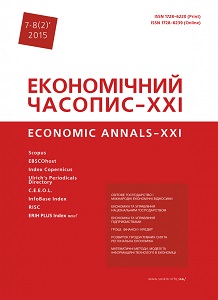Комплексна оцінка стану продовольчої безпеки України
Harmonization of Ukraine’s legislation covering the assessment of food security with international standards
Author(s): Anastasiia PoltorakSubject(s): Economy
Published by: Institute of Society Transformation
Keywords: Food Security; Indicators of Food Security; Assessment of Food Security; Food Safety; Harmonization; Ukraine
Summary/Abstract: Introduction. The methodology of assessment of food security in Ukraine provides for the use of lists of indicators, which help to objectively compare the situation of food security in the country by regions and periods. In the conditions of deepening economic integration it is necessary to adjust the list of Ukraine’s food security indicators as well as the country’s legislation to international standards. Purpose. The main objectives of this study are to analyse lists of indicators of food security in Ukraine and compare them with international standards; to single out strengths and weaknesses of food safety in Ukraine; to make proposals regarding the adjustment of the lists of food security indicators in Ukraine, as well as the country’s legislation to international standards. Results. The study deals with lists of food security indicators in Ukraine which are used as the modern legislative and regulatory framework in Ukraine, e.g. the Resolution of the Cabinet of Ministers of Ukraine No 1379 from December 5, 2007 and the Order of the Ministry of Economic Development and Trade of Ukraine No 1277 from October 29, 2013. It has been found out that the two documents greatly vary. Besides, there is no compliance of the given lists with the international methodologies of food security assessment such as the Global Food Security Index and the methodology of the Food and Agriculture Organization of the United Nations. The study singles out the strengths of food security in Ukraine, including the percentage of population living below the global poverty line, food loss, agricultural import tariffs, food safety, sufficiency of supply; as well as the weaknesses, such as political stability risk, gross domestic product per capita, public expenditure on agricultural R&D, corruption. Conclusion. In order to harmonize Ukraine’s legislation with international standards it is suggested to reconcile the national methodologies of food safety situation assessment by reviewing the indicators proposed in them; to introduce a number of indicators, such as the average consumption of carbohydrates, fats and proteins, vitamins, microelements and fatty acids, which values correspond to the recommendations of the World Health Organization. It is also suggested to take into account the proportion of food energy obtained from the consumption of alcohol, carbohydrates, fats and proteins while assessing food security in Ukraine.
Journal: Економічний часопис - ХХІ
- Issue Year: 153/2015
- Issue No: 07+08 (2)
- Page Range: 15-18
- Page Count: 4

